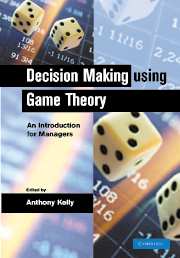Book contents
- Frontmatter
- Contents
- Preface
- 1 Introduction
- 2 Games of skill
- 3 Games of chance
- 4 Sequential decision making and cooperative games of strategy
- 5 Two-person zero-sum games of strategy
- 6 Two-person mixed-motive games of strategy
- 7 Repeated games
- 8 Multi-person games, coalitions and power
- 9 A critique of game theory
- Appendix A Proof of the minimax theorem
- Appendix B Proof of Bayes's theorem
- Bibiliography
- Index
7 - Repeated games
Published online by Cambridge University Press: 02 December 2009
- Frontmatter
- Contents
- Preface
- 1 Introduction
- 2 Games of skill
- 3 Games of chance
- 4 Sequential decision making and cooperative games of strategy
- 5 Two-person zero-sum games of strategy
- 6 Two-person mixed-motive games of strategy
- 7 Repeated games
- 8 Multi-person games, coalitions and power
- 9 A critique of game theory
- Appendix A Proof of the minimax theorem
- Appendix B Proof of Bayes's theorem
- Bibiliography
- Index
Summary
Life is an offensive, directed against the repetitious mechanism of the universe.
A.N. Whitehead 1933 ‘Adventures of Ideas’In everyday life, when people interact, they usually do so as part of a developing dynamic relationship, and when people interact with organisations, they do so on a continuous basis rather than as a series of one-off events. In such circumstances of repeated interaction, individual players learn to coordinate their strategies so as to avoid inefficient outcomes. This chapter examines how such repeated dynamic games can be analysed and how repetition affects those outcomes. It examines the important concepts of credibility, threat and sub-game perfection as applied to dynamic games.
Initially, the chapter examines infinitely repeated games where the one-off game has a unique Nash equilibrium. It is demonstrated that, provided players do not discount future returns too much, a cooperative non-collusive outcome can be sustained, but that this result collapses if the game is finitely repeated. The chapter then goes on to look at finitely repeated games where the one-off game has a unique Nash equilibrium and examines the paradox of backward induction and four proposals for avoiding it – bounded rationality, multiple Nash equilibria, uncertainty, and incompleteness of information.
Information
- Type
- Chapter
- Information
- Decision Making Using Game TheoryAn Introduction for Managers, pp. 135 - 148Publisher: Cambridge University PressPrint publication year: 2003
